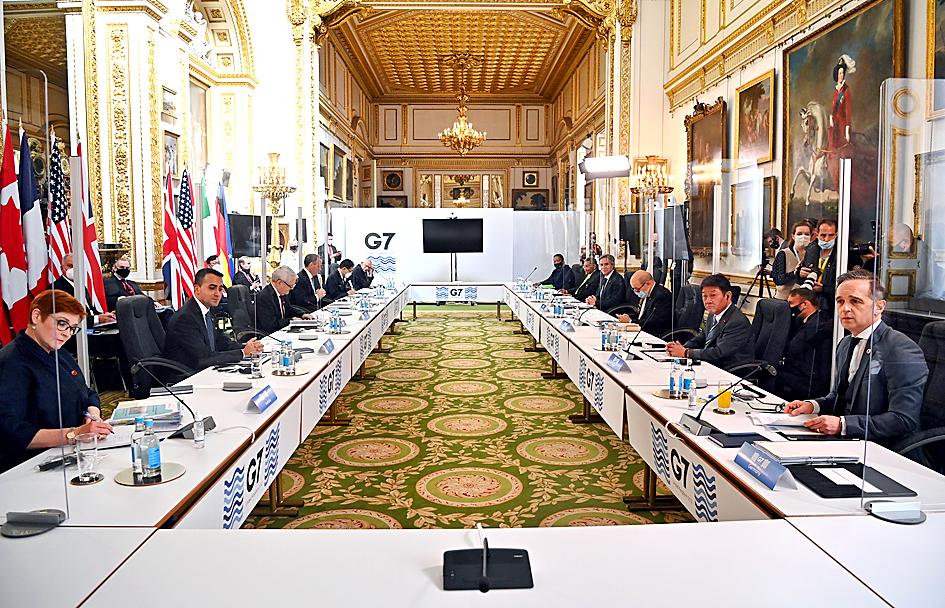The joint statement to be issued after the G7 foreign ministers’ meeting is expected to include strong support for Taiwan’s participation in the WHO and other international organizations, a senior US Department of State official told Japanese media on Tuesday.
The Asahi Shimbun in a report yesterday quoted the unnamed official as saying that Taiwan’s participation would help other nations fight the COVID-19 pandemic.
“Not only does Taiwan have the right to participate, but it has a lot of experience that can help all of us in the fight against COVID-19,” the official said. “It would be self-defeating to exclude them.”

Photo: Reuters
The report also quoted the official as saying that China dominated discussions during the second day of meetings on Tuesday.
“The China issue was the most important of the many important issues we had to discuss,” they said.
Ministers in attendance expressed strong concerns about China’s human rights abuses, the official said.
Human rights “are not a domestic issue; it is an issue that should be acted upon in accordance with the international obligations that China has signed,” they said, citing the Universal Declaration of Human Rights and other international covenants.
Attendees also discussed China’s economic coercion and increasing military activity in the South China Sea, the report said.
The G7 foreign ministers’ meeting was held in London from Monday to yesterday ahead of the main summit, which is to be held in Cornwall, England, from June 11 to 13.
It was the first in-person meeting of the G7 to be held since August 2019 in Biarritz, France.

MORE VISITORS: The Tourism Administration said that it is seeing positive prospects in its efforts to expand the tourism market in North America and Europe Taiwan has been ranked as the cheapest place in the world to travel to this year, based on a list recommended by NerdWallet. The San Francisco-based personal finance company said that Taiwan topped the list of 16 nations it chose for budget travelers because US tourists do not need visas and travelers can easily have a good meal for less than US$10. A bus ride in Taipei costs just under US$0.50, while subway rides start at US$0.60, the firm said, adding that public transportation in Taiwan is easy to navigate. The firm also called Taiwan a “food lover’s paradise,” citing inexpensive breakfast stalls

TRADE: A mandatory declaration of origin for manufactured goods bound for the US is to take effect on May 7 to block China from exploiting Taiwan’s trade channels All products manufactured in Taiwan and exported to the US must include a signed declaration of origin starting on May 7, the Bureau of Foreign Trade announced yesterday. US President Donald Trump on April 2 imposed a 32 percent tariff on imports from Taiwan, but one week later announced a 90-day pause on its implementation. However, a universal 10 percent tariff was immediately applied to most imports from around the world. On April 12, the Trump administration further exempted computers, smartphones and semiconductors from the new tariffs. In response, President William Lai’s (賴清德) administration has introduced a series of countermeasures to support affected

CROSS-STRAIT: The vast majority of Taiwanese support maintaining the ‘status quo,’ while concern is rising about Beijing’s influence operations More than eight out of 10 Taiwanese reject Beijing’s “one country, two systems” framework for cross-strait relations, according to a survey released by the Mainland Affairs Council (MAC) on Thursday. The MAC’s latest quarterly survey found that 84.4 percent of respondents opposed Beijing’s “one country, two systems” formula for handling cross-strait relations — a figure consistent with past polling. Over the past three years, opposition to the framework has remained high, ranging from a low of 83.6 percent in April 2023 to a peak of 89.6 percent in April last year. In the most recent poll, 82.5 percent also rejected China’s

PLUGGING HOLES: The amendments would bring the legislation in line with systems found in other countries such as Japan and the US, Legislator Chen Kuan-ting said Democratic Progressive Party (DPP) Legislator Chen Kuan-ting (陳冠廷) has proposed amending national security legislation amid a spate of espionage cases. Potential gaps in security vetting procedures for personnel with access to sensitive information prompted him to propose the amendments, which would introduce changes to Article 14 of the Classified National Security Information Protection Act (國家機密保護法), Chen said yesterday. The proposal, which aims to enhance interagency vetting procedures and reduce the risk of classified information leaks, would establish a comprehensive security clearance system in Taiwan, he said. The amendment would require character and loyalty checks for civil servants and intelligence personnel prior to